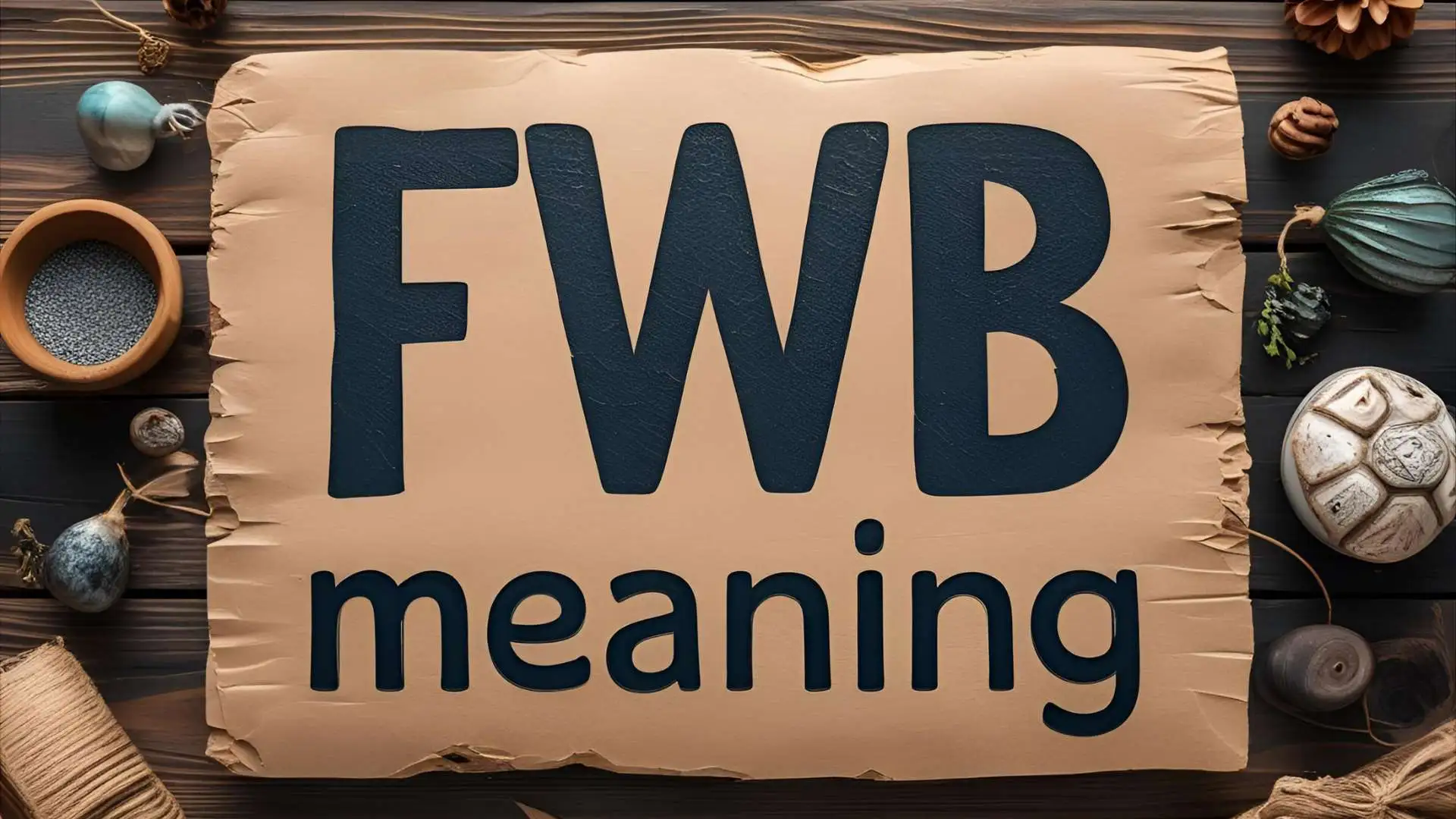Modern dating has completely reshaped how people view relationships. From casual relationships to open relationships,
The lines between friendship, romance, and intimacy have blurred. One of the most popular yet misunderstood terms is FWB, short for friends with benefits.
At its core, FWB describes two people who maintain a friendship while engaging in non-romantic intimacy.
Unlike traditional dating, there’s no expectation of commitment or long-term partnership. For many, this arrangement offers sexual relationships without commitment, but it’s not as simple as it sounds.
This guide explores the meaning of FWB, how it works, the expectations and rules, the risks involved, and whether it’s the right fit for you.
What Does FWB (Friends With Benefits) Really Mean?

Friends with benefits means a friendship that includes a sexual relationship, but without the traditional obligations of dating or romance.
To clarify:
- Not just a hookup – Unlike a one-night stand, FWB involves ongoing interaction.
- Not a committed relationship – There’s no exclusivity or romantic commitment.
- Not purely friendship – Intimacy adds a layer beyond casual friendship.
Think of it as a hybrid relationship structure. You still enjoy the trust and comfort of friendship, while also sharing physical intimacy.
“FWB is about blending friendship with intimacy, but without the strings of romance.”
The Rise of FWB in Modern Dating Culture
The popularity of FWB relationships reflects how dating culture has evolved.
Why FWB is Rising:
- Dating apps: Platforms like Tinder and Bumble normalize casual connections.
- Delayed marriage: Many people postpone long-term commitments.
- Work-focused lifestyles: Busy schedules make traditional dating harder.
- Changing views on intimacy: Society is more open about sexual freedom.
📊 Quick Stat: A study from The Journal of Sex Research found that 54% of young adults reported having at least one FWB arrangement in their lifetime.
Table: FWB vs Other Relationship Types
| Type | Intimacy | Commitment | Exclusivity | Emotional Focus |
| Friends with Benefits | Yes | No | No | Low-Moderate |
| Casual Dating | Yes | Low | Sometimes | Moderate |
| Open Relationship | Yes | Yes | No | High |
| Traditional Romance | Yes | Yes | Yes | High |
| One-Night Stand | Yes | No | No | None |
FWB Expectations and Ground Rules
For an FWB arrangement to work smoothly, clear expectations are crucial.
Ground rules often include:
- Mutual consent: Both agree to the setup without pressure.
- Clear boundaries: Decide whether to hang out socially or only meet for intimacy.
- Defined limits: No romantic gestures (like Valentine’s gifts).
- Openness about other partners: Transparency prevents jealousy.
Example:
If two friends agree on an FWB relationship but one secretly expects it to turn romantic, problems are inevitable.
Communication | The Core of Any FWB Relationship

Strong communication is the glue that holds an FWB together. Without it, misunderstandings quickly escalate.
Topics worth discussing upfront:
- Are we exclusive or free to see others?
- How often will we meet?
- What happens if someone develops feelings?
- How do we handle sexual health and safety?
👉 Red Flag: If a partner avoids conversations about boundaries, they may not respect the friendship side of the deal.
Respect and Boundaries in FWB
Even though there’s no romance, respect remains non-negotiable.
- Respect the friendship: Don’t let intimacy overshadow normal friendship.
- Set physical boundaries: Agree on when and how intimacy happens.
- Maintain emotional limits: Avoid overly romantic actions (e.g., meeting families, daily “good morning” texts).
🔑 Tip: Always remember that friendship comes first. If intimacy damages the bond, the FWB setup isn’t sustainable.
Emotional Dynamics of FWB
FWB relationships might sound simple, but emotions complicate things.
- Attraction vs attachment: Sexual attraction can sometimes grow into emotional attachment.
- Uneven feelings: One person may develop love, while the other stays casual.
- Emotional stability: People who are insecure or easily jealous struggle with FWB.
Signs you’re getting too attached:
- You feel hurt when they date others.
- You expect them to prioritize you.
- You imagine a long-term relationship with them.
Jealousy in FWB Arrangements

Even without romance, jealousy can sneak in.
Triggers of jealousy:
- Seeing your FWB with someone else.
- Feeling neglected when they spend more time with other friends.
- Expecting more attention than the setup allows.
How to handle jealousy:
- Communicate openly when it arises.
- Reassess if the arrangement still works.
- Accept that jealousy may mean deeper feelings are forming.
“If jealousy becomes constant, it’s no longer an FWB—it’s an emotional attachment in disguise.”
Challenges & Complications of FWB
While FWB can be exciting, it comes with challenges.
- Losing the friendship: Once intimacy ends, the friendship might feel awkward.
- Misaligned expectations: One partner might want exclusivity.
- Complications if dating others: A new partner may feel uncomfortable with the ongoing FWB.
- Social judgment: Some people may criticize or misunderstand your choice.
Health & Safety in FWB

Health should never take a back seat in casual intimacy.
Key health considerations:
- Safe sex: Always use protection to prevent STIs.
- STI testing: Regular check-ups for both partners.
- Contraception: Prevent unintended pregnancies.
- Discussing sexual history: Honesty builds trust and safety.
📊 Fact: According to the CDC, 1 in 5 people in the US has a sexually transmitted infection at any given time.
Ending an FWB Relationship the Right Way
FWB isn’t designed to last forever. Ending things respectfully is essential.
Signs it’s time to end it:
- One person develops romantic feelings.
- Jealousy causes regular conflict.
- You’re starting a new committed relationship.
- The friendship itself feels strained.
How to end it respectfully:
- Be honest and clear, not vague.
- Avoid ghosting—it damages the friendship.
- Express gratitude for the good times.
- If possible, maintain the friendship afterward.
Therapy & Guidance for Complex FWB Situations
Sometimes FWB leads to emotional confusion. In such cases, professional support helps.
Therapy options include:
- Couples counseling: If both want to transition to a romantic relationship.
- Individual therapy: For those struggling with attachment issues.
- Neurofeedback therapy: Helps regulate emotional responses.
- Relationship coaching: Guidance on setting boundaries and self-awareness.
📌 Resource: Psychology Today offers a directory of therapists specializing in relationship dynamics.
FWB vs Other Relationship Structures

FWB isn’t the only flexible setup. Comparing it to other models helps clarify.
Comparison:
- FWB vs Casual Dating: Dating often involves romance; FWB is strictly non-romantic intimacy.
- FWB vs Open Relationship: Open couples are committed but allow outside partners.
- FWB vs Long-Term Partnership: Partnerships focus on love, exclusivity, and future planning.
Who FWB Works Best For
Not everyone thrives in an FWB arrangement.
FWB works best for:
- Emotionally stable individuals.
- People who value honesty and communication.
- Those comfortable with non-monogamy.
- Friends who can separate intimacy from love.
Who should avoid FWB:
- People who get attached quickly.
- Those with strong jealousy issues.
- Individuals seeking long-term commitment.
- Friends who already have romantic tension.
Final Thoughts | Is FWB Right for You?
FWB can be fun, flexible, and pressure-free, but only if both people respect the ground rules. It’s not a shortcut to romance, nor is it a cure for loneliness. The success of an FWB relationship depends on communication, emotional stability, respect, and safety.
Before starting, ask yourself:
Am I emotionally prepared for casual intimacy? Can I handle seeing them with other partners? Will this damage or strengthen our friendship?


